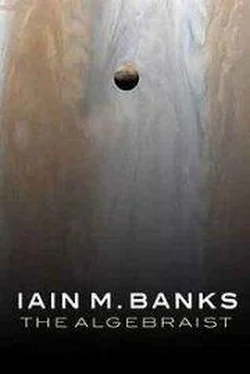“I see.”
“Your emissarial projection gave no hint whether this might be correct or not?”
“None, sir.” Fassin paused. “Uncle, am I in trouble?”
Slovius sighed. “If I had to guess, nephew, I would surmise that you are not in direct trouble as such. However, I will confess to the distinct and unsettling feeling that very large, very ponderous and most momentous wheels have been set in motion. When that happens I believe the lessons of history tend to indicate that it is best not to be in their way. Even without meaning harm, the workings and progress of such wheels are on a scale which inevitably reduces the worth of individual lives to an irrelevance at best.”
“At best?”
“At best. At worst, lives, their sacrifice, provide the oil required to make the wheels move. Does my explanation satisfy you?”
“That might be one word for it, sir, yes.”
“Well then, it would appear we are equally in the dark, nephew.” Slovius consulted a little ring embedded in one of his finger stubs. “And in the dark, sleep can be a good idea. I suggest you get some.”
“Well, Fassin Taak,” Verpych said briskly, waiting for him outside the door. “Finally you’ve done something that I find impressive. Thanks to you, not only do we appear to be about to start living in interesting times, you have succeeded in bringing us to the attention of people in high places. Congratulations.”
They sat on half-inflated bedrolls, their backs against the sides of the flier. “He’s never told you about all that Severity School stuff?” Fassin asked.
Taince shook her head. “Nope.” She took out her little grey military communicator again, checking in vain for reception. She and Fassin had already walked out to the hull gap half an hour earlier, looking for a signal either on this device or their phones. They’d stood there in the bright, flickering glow of a heavy aurora display, Nasqueron a vast inverted dome above, dark but sheened with its own rippling auroras and specked with a random craquelure of lightning bursts. A series of small ground-quakes had vibrated through their boots, but for all this natural turmoil — and perhaps partially because of the magnetic activity in the case of the phones — they had heard nothing through their machines.
They’d tramped back, Fassin grumbling about Beyonders for attacking a planet best known for its peaceful Dwellers Studies faculties in the first place, and the Guard, Navarchy Military, Ambient Squadrons and Summed Fleet for not protecting them better. Taince tried to explain about the logistics of moving sufficient numbers of needle ships and other bits of materiel through “holes to where they’d be needed, and the equations which governed how many assets you would need fully to protect the many scattered systems of the Mercatoria. Even with the near-instantaneousness of portal-to-portal Arteria travel, it was an unfeasible, economically unsupportable number. The many enemy groupings might be collectively puny, but they were widely distributed and often working on an awkwardly extended timescale. The main thing was that ’glantine and Ulubis system as a whole were safe. Its own Squadrons were a match for any feasible Beyonder grouping, and behind them, just a few portal jumps away, lay the matchless superiority of the Summed Fleet.
None of this prevented Fassin from continuing to moan about the Beyonders’ nuisance attacks, so Taince had shifted the conversation to their classmates’ foibles, proclivities and eccentricities and before very long they’d got to Saluus.
“Well,” Taince said, “he’s mentioned going to Severity School but he’s never volunteered anything much about it and I’m not his interrogator.”
“Oh,” Fassin said. He wondered if maybe Saluus and Taince weren’t lovers after all. School, early life… that was the stuff of pillow talk, wasn’t it? He stole a glance at Taince. Though “lovers’ somehow didn’t seem like the right word anyway, not for Sal and Tain, assuming they were involved. They each seemed different from everybody else in their year, less obviously caught up in the whole dating, young love and experimental sex scene, as though they’d gone through all that already or were just, through natural predisposition or sheer determination, immune to it somehow.
Taince intimidated most boys her own age and a lot who were significantly older, but she didn’t care. Fassin had seen her turn down a couple of very nice, decent lads with a bruising degree of brusqueness, and then take off for what were pretty obviously one- or few-nighters with burly but boring guys. He had also known at least three girls in their school year who were hopelessly in love with Taince, but she hadn’t cared about that either.
Saluus had been in an even stronger position from the start; not just good-looking — anybody could be that — but easy with it, and assured, charming and funny as well. All that and money! A fortune to inherit, another beckoning world of even more finely graded superiority that existed alongside the monumental, bamboozling, hierarchic system that had surrounded them all since birth, presenting an alternative infrastructure of reward which was both younger and older than the Mercatoria’s colossal edifice, if ultimately entirely subordinate to it. Like the rest of the boys in his year — like most in the entire college — Fassin had long since come to terms with the fact that as long as Sal was around, you were always second-best.
And yet neither Taince nor Sal — especially Sal — took advantage of their chances. Except maybe with each other.
It was like they were adults before their time, with their own steely, determined agendas, and sex was no more than an itch that had to be scratched, an irritating unter-hunger which sporadically necessitated being dealt with as quickly and efficiently as possible with the minimum of distractive fuss, so that the real, serious business of life could be attended to.
Weird.
“Why?” Taince asked. “Did you go to Sev School too, Fass?”
“Me?” Fassin said, astonished. “Shit, no!”
“Right,” Taince said. She was sitting with one leg stretched out, one folded, hand resting on her knee. “So,” she flapped her hand. “Tough, is it?”
“They hunt them!” Fassin told her.
Taince shrugged. “So I’ve heard. At least they don’t eat them.”
“Ha! They still die sometimes. I’m serious. These are just little kids. They fall off cliffs or out of trees or into crevasses or they kill themselves, they’re so stressed. Some get lost in the outwoods and get hunted and killed and eaten by real predators.”
“Mm-hmm. High drop-out rate, then.”
“Taince, doesn’t any of that bother you?” Taince grinned at him. “What, you mean arouse my maternal instincts, Fass?” He didn’t answer. She shook her head. “Well, it doesn’t. You want to ask me do I feel sorry for these junior members of the Acquisitariat? Yes, for the ones that don’t make it out. Or the ones that leave hating their parents. For the others, it does what it’s supposed to do, I guess; produces another generation of the truly selfish. Well, not my department. Don’t even think about them. If I did maybe I’d despise them, but I don’t so I don’t. Maybe I’d admire them. Sounds worse than basic training.”
“You have a choice with basic training. These little—”
“Not if you’re drafted.”
“ Drafted?”
“Laws are still on the statute books.” She shrugged. “But your point is taken. It’s tough on those kids. But it’s legal and, well, the rich are another breed.” She sounded unconcerned. “Sal’s really never said anything?”
Something in his tone made Taince look at Fassin. “You mean, like,” she waggled her dark eyebrows, “‘afterwards’, Fassin?” He looked away. “As you will.”
Читать дальше












